Are you tired of waiting on hold for hours just to speak to a customer service rep?
Imagine having a virtual assistant that understands your needs, responds instantly, and is available 24/7. That’s the power of conversational AI!
AI-driven solutions like chatbots and voice assistants are becoming essential tools for improving customer experience. As more companies prioritize automation, global spending on AI is expected to reach $826.70 billion by 2034.
But what exactly is conversational AI, and why should your business care? Rd on to find out the top 10 conversational AI platforms for your business.
If you're just starting with conversational AI, I suggest choosing a platform like Ada or Google Dialogflow. They’re beginner-friendly and offer a quick setup with minimal technical know-how. Start small by automating common customer queries, and as you get comfortable, scale up to more complex use cases like lead generation or proactive support. This way, you’ll see tangible results without feeling overwhelmed.
What is Conversational AI?
A conversational AI platform is an advanced system that enables computers to engage in meaningful and natural conversations with humans through voice or text. It uses a blend of artificial intelligence technologies to simulate human-like interactions, allowing users to communicate as they would with another person.
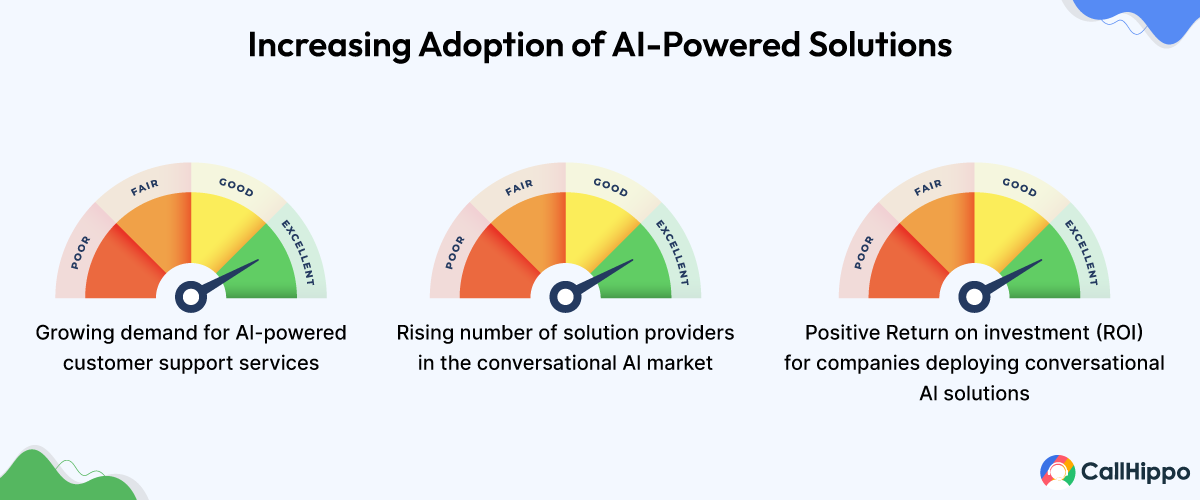
Unlike traditional rule-based systems, conversational AI technology adapts and improves over time. This makes it invaluable for businesses seeking to enhance customer engagement, automate support processes, and deliver personalized experiences at scale.
Top 10 Conversational AI Platforms
Conversational AI software is transforming how businesses engage with their customers, offering smart, automated solutions to enhance communication. With numerous options available, selecting the right platform can be overwhelming.
| Brand Name | Rating | Key Features | Pricing |
|---|---|---|---|
| Dialogflow by Google | Natural Language Understanding (NLU) and processing Multi-platform support Contextual awareness Integration with external APIs, databases | There’s no trial or pricing information on the vendor's website. | |
| IBM Watson Assistant | Conversational search with generative AI Reasoning and User Intent Recognition Auto-learning AI technology Advanced Natural Language Understanding | Lite: 0 USD Plus: Starting at USD 140/month Enterprise: On Request | |
| Microsoft Azure Bot Services | Integrated Development Environment (IDE) Multi-channel deployment Natural Language Processing (NLP) Pre-built templates | Free Trial and Pay-as-you-go | |
| Rasa | Natural Language Understanding Dialogue management Custom actions and integrations Flexible deployment options | Free and On Request | |
| Kore.ai | SmartAssist Advanced Natural Language Generation (NLG) Multi-channel support Virtual banking assistants | Essential: $50/mo Advanced: $150/mo |
At CallHippo, we thoroughly researched and analyzed these platforms with the help of our expert team. By evaluating factors like NLP capabilities, scalability, pricing, and ratings & reviews from SoftwareSuggest, G2, and Capterra, we’ve curated a list of the top 10 conversational AI platforms that can improve customer experience.
1. IBM Watson Assistant
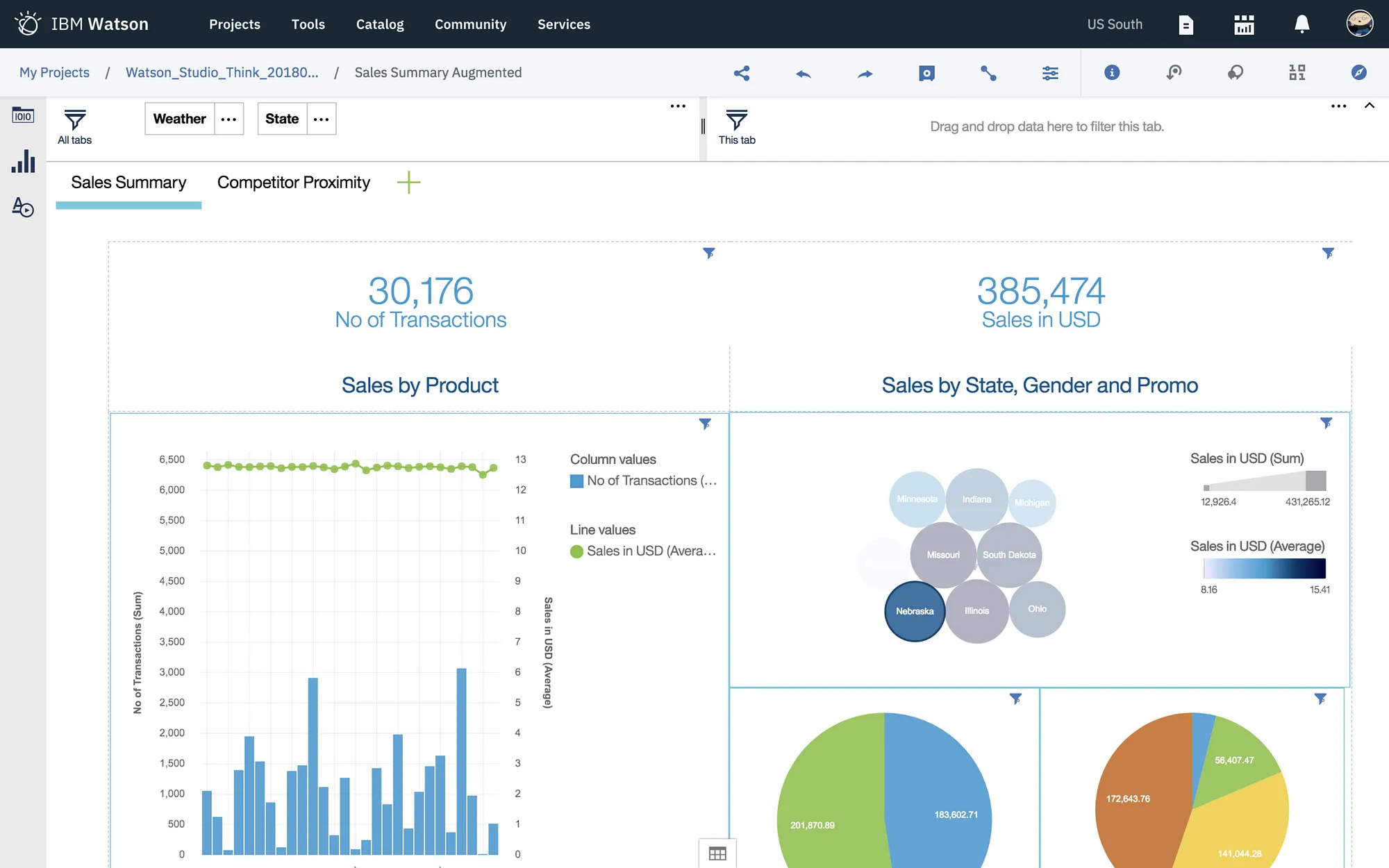
IBM Watson Assistant is a next-generation conversational AI platform designed to empower organizations to create intelligent virtual agents.
With its user-friendly interface, businesses can build generative AI assistants that improve customer experiences across various channels. It features advanced natural language processing capabilities, enabling accurate and context-aware interactions.
Key Features
- Natural Language Understanding (NLU)
- Visual dialog editor
- Multi-channel integration
- Pre-built templates
- Analytics dashboard
Pros
- The platform allows you to generate custom reports and statistical analysis.
- It offers the automatic generation of daily reports.
- The tool can be deployed across various platforms, including websites, messaging apps, and social media.
Cons
- The platform may involve a lengthy setup and integration process.
- The depth of features may overwhelm new users or those without technical expertise.
Pricing
- Plus: $140/mo
- Enterprise: Contact the sales team
*Pricing as of 07-11-2024*
2. Google Dialogflow
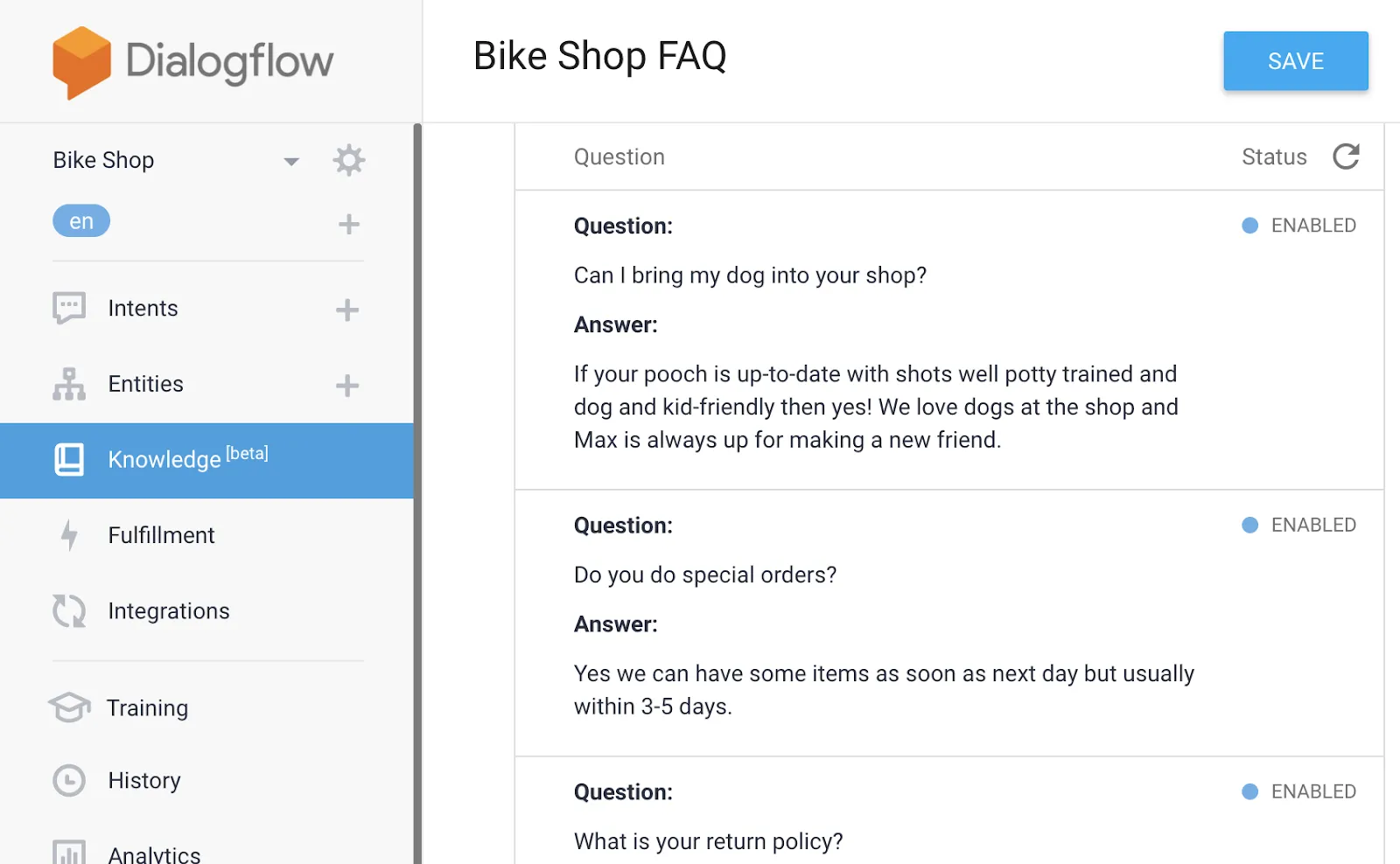
Google Dialogflow is a powerful conversational AI platform by Google Cloud that enables businesses to create text and voice-based interfaces.
It offers seamless integration with Google services, supports multiple languages, and is ideal for developing AI-driven chatbots and virtual assistants.
Key Features
- Context management
- Multi-channel integration
- Sentiment analysis
- Analytics dashboard
- Automatic spelling correction
- Prebuilt agents and templates
Pros
- The platform supports seamless integration with various messaging platforms like Facebook Messenger, Slack, and Google Assistant.
- It provides numerous prebuilt agents that save time in development by offering ready-made intents.
- As a fully cloud-based platform, the tool eliminates the need for separate hosting.
Cons
- The platform expects responses from connected backends within five seconds; otherwise, it may time out.
- It lacks built-in options for seamlessly transferring conversations to human agents when needed.
Pricing
There’s no trial or pricing information on the vendor’s website.
*Pricing as of 07-11-2024*
3. Microsoft Azure Bot Service
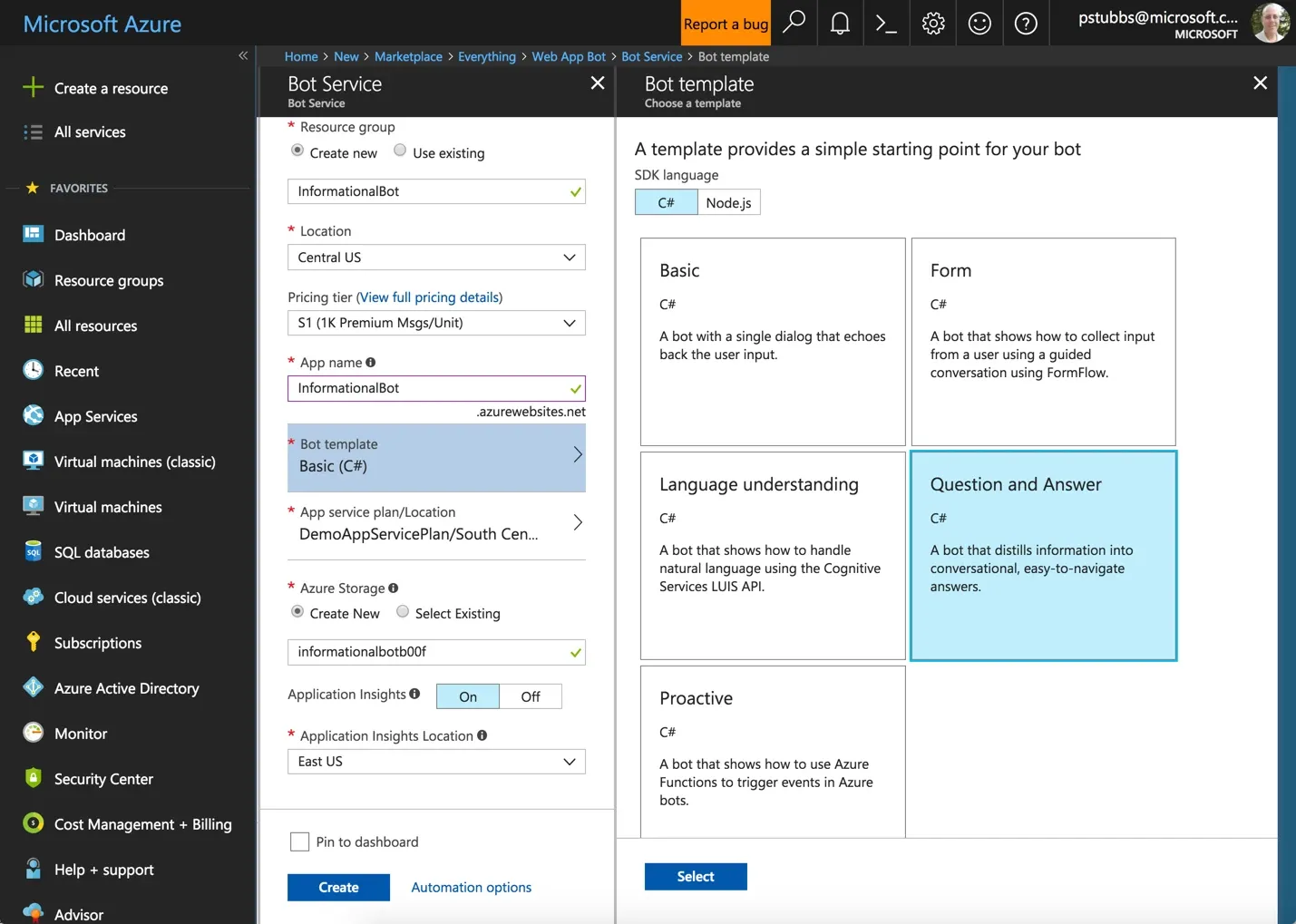
Microsoft Azure Bot Services offers a robust and scalable solution for businesses aiming to develop chatbots.
Leveraging Microsoft’s cloud infrastructure, this AI chat software supports multi-channel deployment and integrates smoothly with Azure’s suite of services, including cognitive services and databases. This integration provides a versatile and flexible platform suitable for a wide range of business applications.
Key Features
- Integrated Development Environment (IDE)
- Multi-channel deployment
- Natural Language Processing (NLP)
- Integration with other Azure services
- Pre-built templates
Pros
- It offers ready-to-use templates that accelerate bot development by providing pre-defined structures.
- Bots can send proactive messages to users based on triggers or events.
- The platform supports advanced AI functionalities such as language understanding, speech recognition, and image processing.
Cons
- Building complex bots often involves significant coding and configuration.
- While there are free tiers available, costs can escalate quickly with increased usage and premium features.
Pricing
Free Trial and Pay-as-you-go.
*Pricing as of 07-11-2024*
4. CallHippo AI Voice Agent
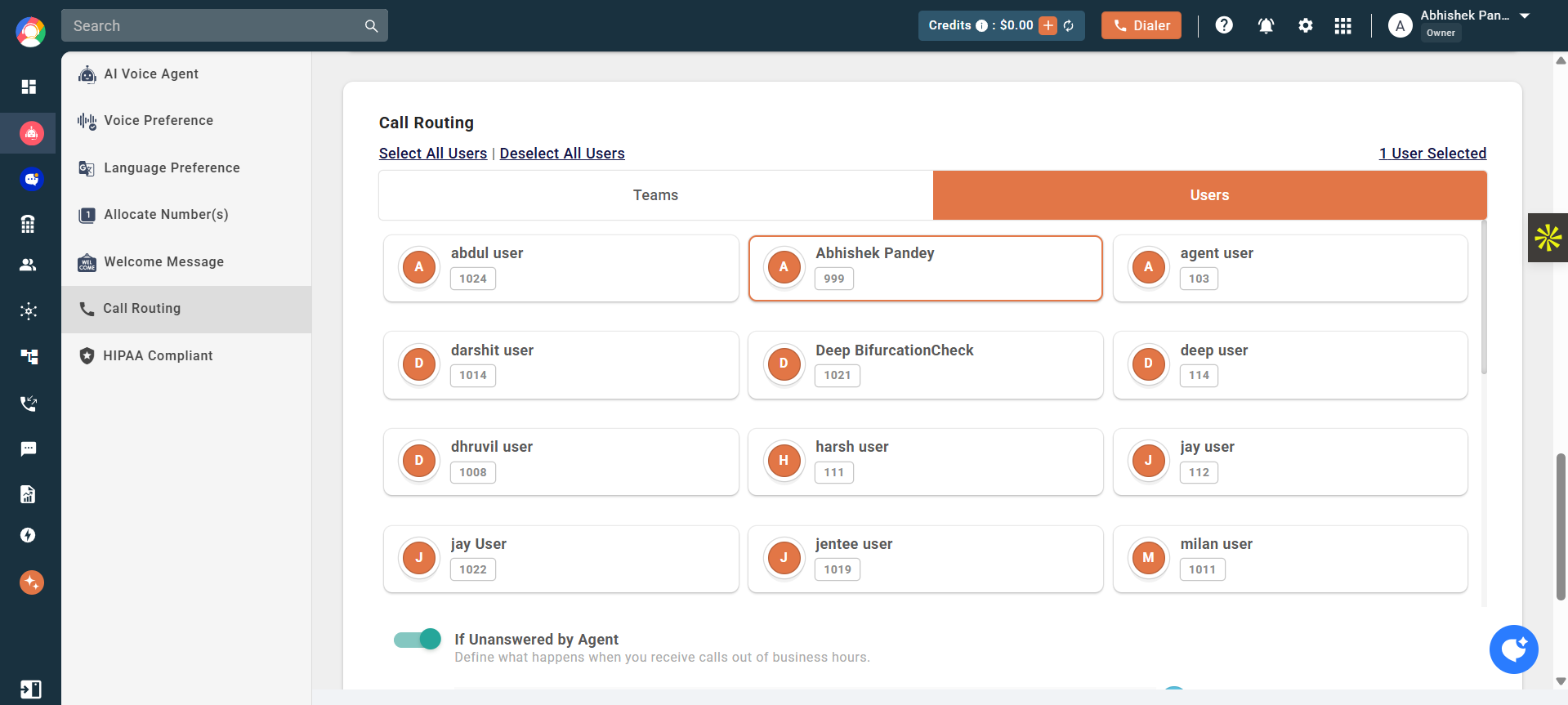
The CallHippo AI Voice Agent is designed to manage inbound and outbound calls with precision. Advanced NLP and speech recognition power the system. CallHippo AI Voice Agent can qualify leads, answer queries, route calls, and schedule appointments, without any human intervention.
It ensures 24/7 availability and integrates seamlessly with CRMs, calendars, and helpdesk tools to streamline operations and improve customer satisfaction.
Key Features
- 24/7 intelligent call handling
- Human-like conversations
- Smart call routing
- Lead qualification
- Multilingual support
- CRM & calendar integration
- Real-time analytics
- No-code setup
- Natural and personalized conversation flow
- Handles high call volumes without quality drop
- Easy setup and integration into existing systems
- Multilingual capabilities for diverse audiences
- Limited deep workflow customization for complex niche use cases
- Requires a stable internet connection for best performance
Pricing
- AI Core Agent – $0/month
- AI Pro Agent – $399/month
- AI Max Agent – $799/month
- AI Ultra Pro Max Agent – $1199/month
5. Amazon Lex
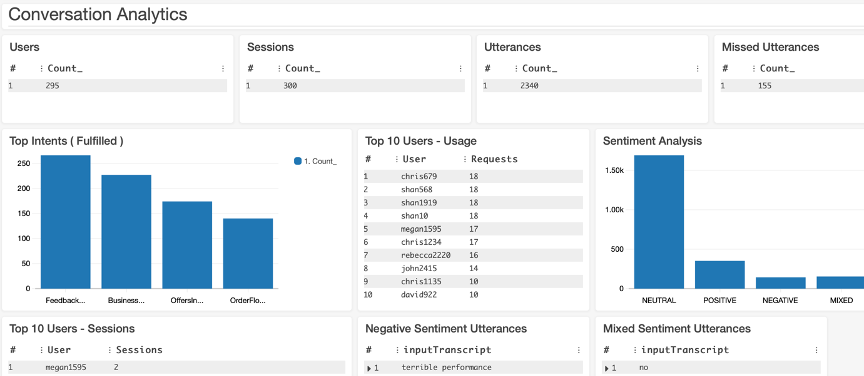
Amazon Lex is a fully managed service that enables developers to build conversational interfaces using voice and text.
Leveraging the same deep learning technologies as Amazon Alexa, Lex allows for the creation of chatbots that can automate tasks, enhance customer interactions, and provide seamless multi-channel experiences.
Key Features
- Automatic Speech Recognition (ASR)
- Multi-turn conversations
- Omni-channel deployment
- Telephony support
- Built-in prompts
Pros
- The platform allows developers to create conversational interfaces that support both voice and text.
- The platform supports easy integration with multiple channels, including web applications, mobile apps, and contact centers.
- Amazon Lex operates on a pay-as-you-go pricing structure, charging only for the number of text and speech requests processed.
Cons
- The platform has a character limit of 1,024 for input text, which can restrict user interactions.
- There are strict quotas on the number of bots, intents, and slots that can be created per AWS account.
Pricing
Amazon Lex employs a pay-as-you-go pricing structure.
*Pricing as of 07-11-2024*
6. Rasa
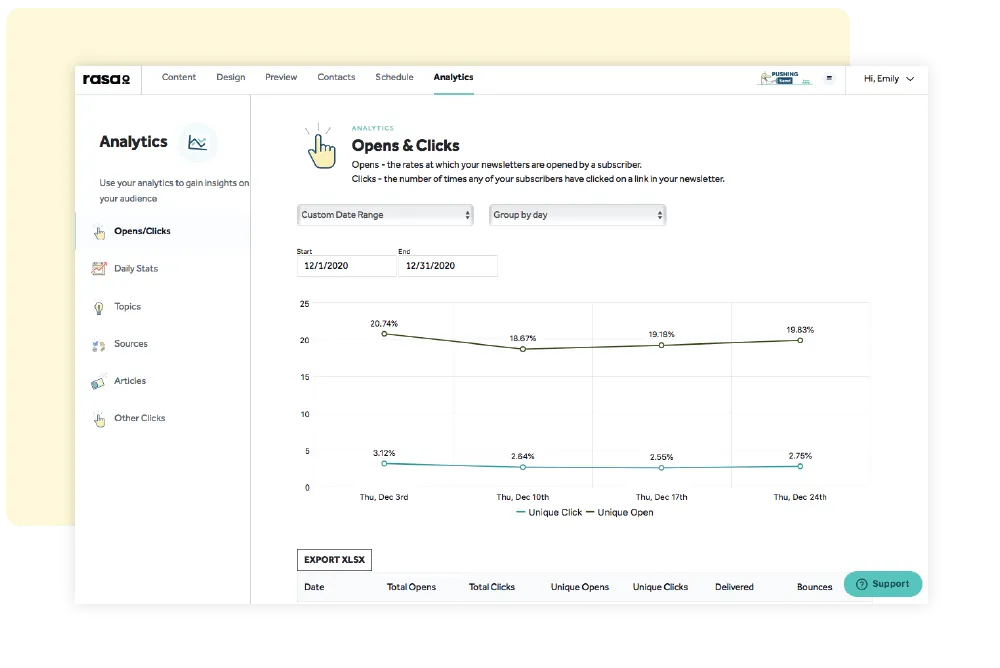
Rasa is an open-source conversational AI platform that empowers developers to create contextual chatbots and AI assistants. It features a flexible architecture, allowing for extensive customization and integration with various messaging channels.
Rasa’s components, including Rasa NLU and Rasa Core, enable sophisticated dialogue management and natural language understanding.
Key Features
- Dialogue management
- Open-source framework
- Integrations with third-party services
- Contextual memory
- Modular architecture
- Multi-language support
Pros
- The platform’s open-source nature allows developers to customize and extend the framework according to their specific needs.
- The tool can operate offline, making it suitable for use in IoT devices.
- The platform utilizes state-driven machine-learning models for dialogue management.
Cons
- Training models in Rasa can be resource-intensive, requiring substantial computational power and time.
- It often relies on third-party libraries for certain functionalities.
Pricing
Contact with the Rasa sales team for further pricing details.
*Pricing as of 07-11-2024*
7. Kore.ai
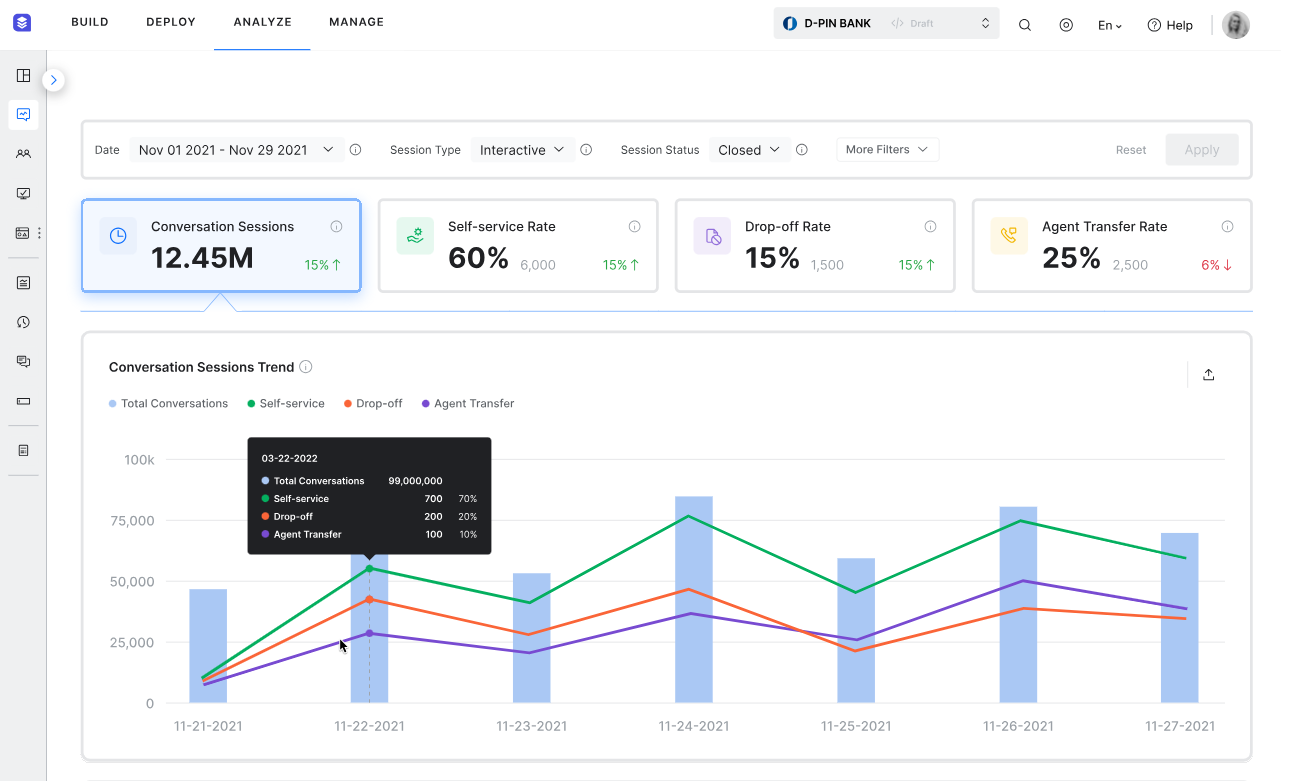
Kore.ai is a comprehensive conversational AI platform that provides no-code solutions for building intelligent virtual assistants.
It offers a comprehensive suite of tools for customer, employee, and agent experiences, including SmartAssist for cloud contact centers and BankAssist for retail banking. Kore.ai focuses on enhancing engagement through advanced AI capabilities.
Key Features
- SmartAssist
- Advanced Natural Language Generation (NLG)
- Multi-channel support
- SearchAssist for conversational cognitive search
- Virtual banking assistants
- Integration with third-party APIs
Pros
- The tool allows users to build and deploy conversational AI solutions without requiring extensive coding skills.
- The platform supports deployment across over 30 messaging channels.
- It supports voice interactions, allowing businesses to create voice-enabled assistants that enhance accessibility.
Cons
- The platform imposes rate limits on public APIs at the bot level.
- Sometimes, the conversation freezes due to high usage.
Pricing
- Essential: $50/mo
- Advanced: $150/mo
*Pricing as of 07-11-2024*
8. LivePerson
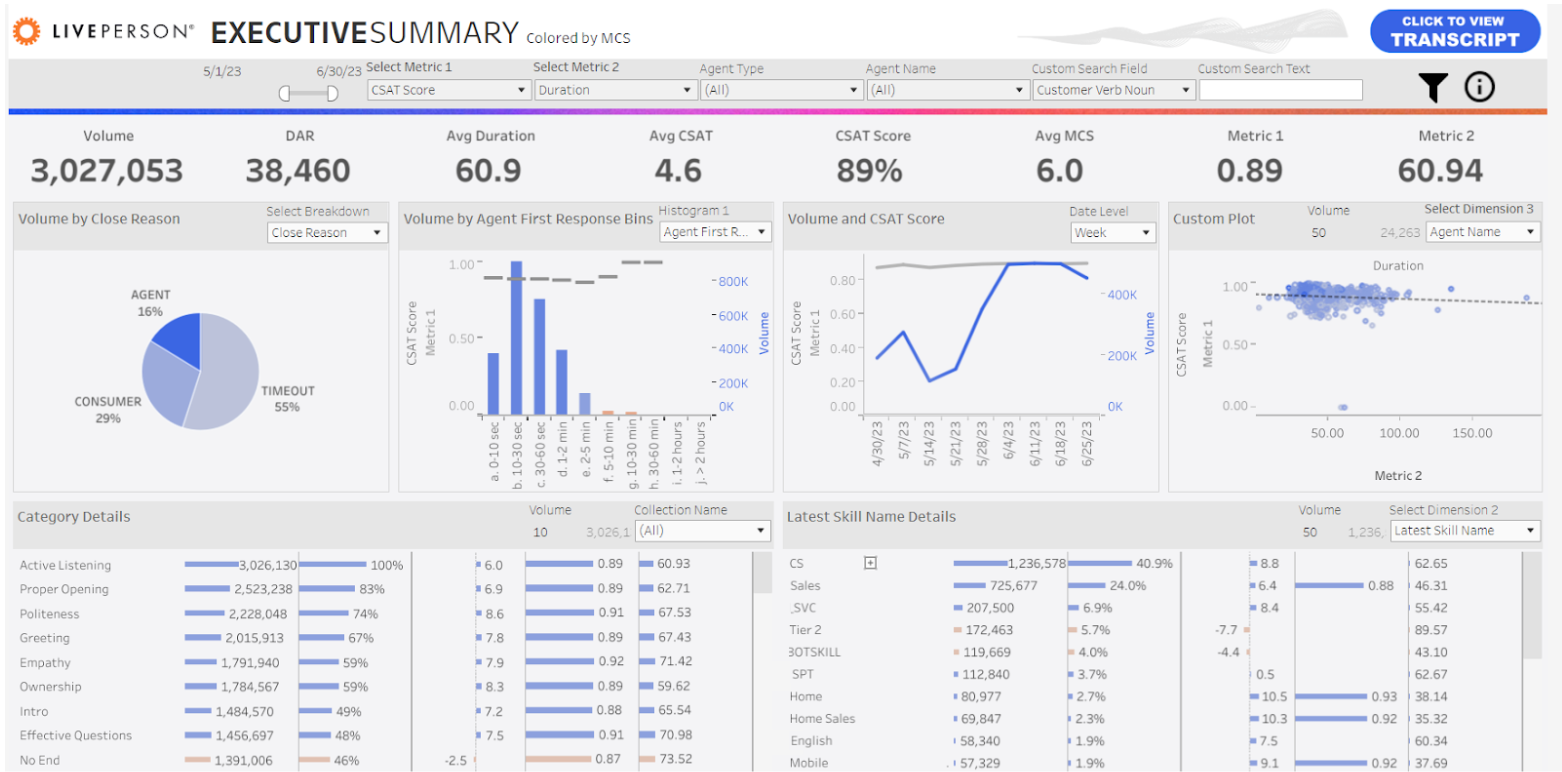
LivePerson is a cloud-based conversational AI platform that specializes in conversational commerce.
It offers features like live chat, messaging, and voice interactions, enabling businesses to engage with customers in real-time and drive sales. LivePerson also provides analytics and automation tools to optimize customer interactions and improve conversion rates.
Key Features
- Multi-channel messaging support
- Voice and video call capabilities
- Push notifications
- Outbound communication
- Conversation starter chips
Pros
- The platform allows brands to initiate conversations with customers through targeted outbound messaging.
- The tool enables the use of rich media formats, such as images and carousels.
- Agents can personalize their interactions with customers by using nicknames and avatars.
Cons
- As a cloud-based solution, LivePerson's performance is heavily reliant on stable internet connectivity.
- While the platform offers various templates, some users may find the customization options restrictive.
Pricing
Contact the sales team for pricing details.
*Pricing as of 07-11-2024*
9. Cognigy
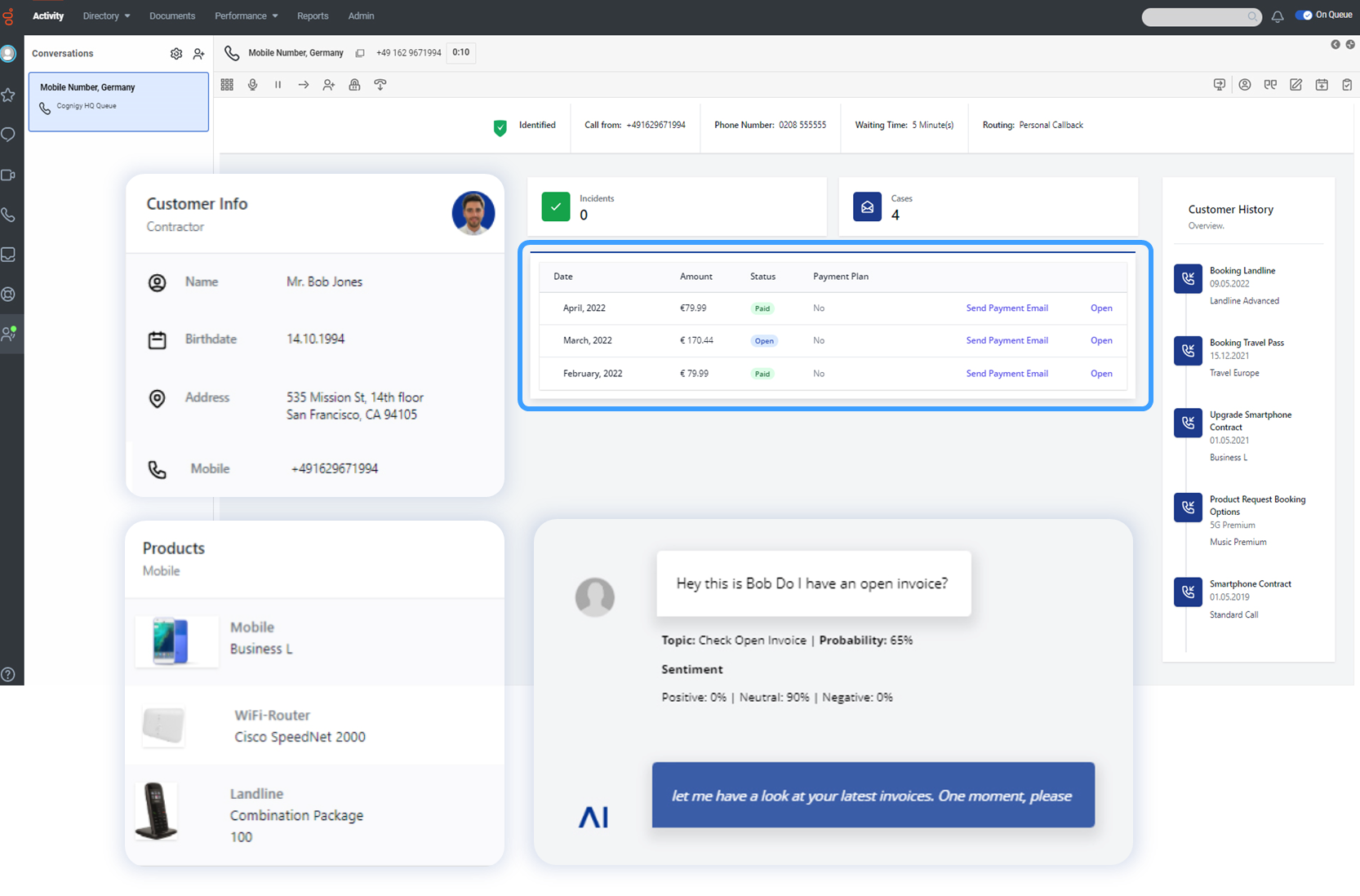
Cognigy is an enterprise-grade conversational AI platform designed for complex workflows and integrations.
It offers a low-code development environment, omnichannel support, and advanced features like sentiment analysis and machine learning. Cognigy is ideal for businesses with high-security needs and complex customer interactions.
Key Features
- Pre-built application components (xApps)
- Real-time analytics
- Customizable conversation flows
- AI Copilot
Pros
- The platform combines traditional NLU with generative AI, enabling dynamic and context-sensitive conversations.
- The tool supports over 100 languages.
- It can be deployed across various channels, including web, mobile, and voice interfaces.
Cons
- Integrating Cognigy with existing systems like CRMs and ERPs can be challenging.
- The platform restricts the maximum number of concurrent Playbook executions to 10.
Pricing
Get a demo and understand the pricing details.
*Pricing as of 07-11-2024*
10. Ada
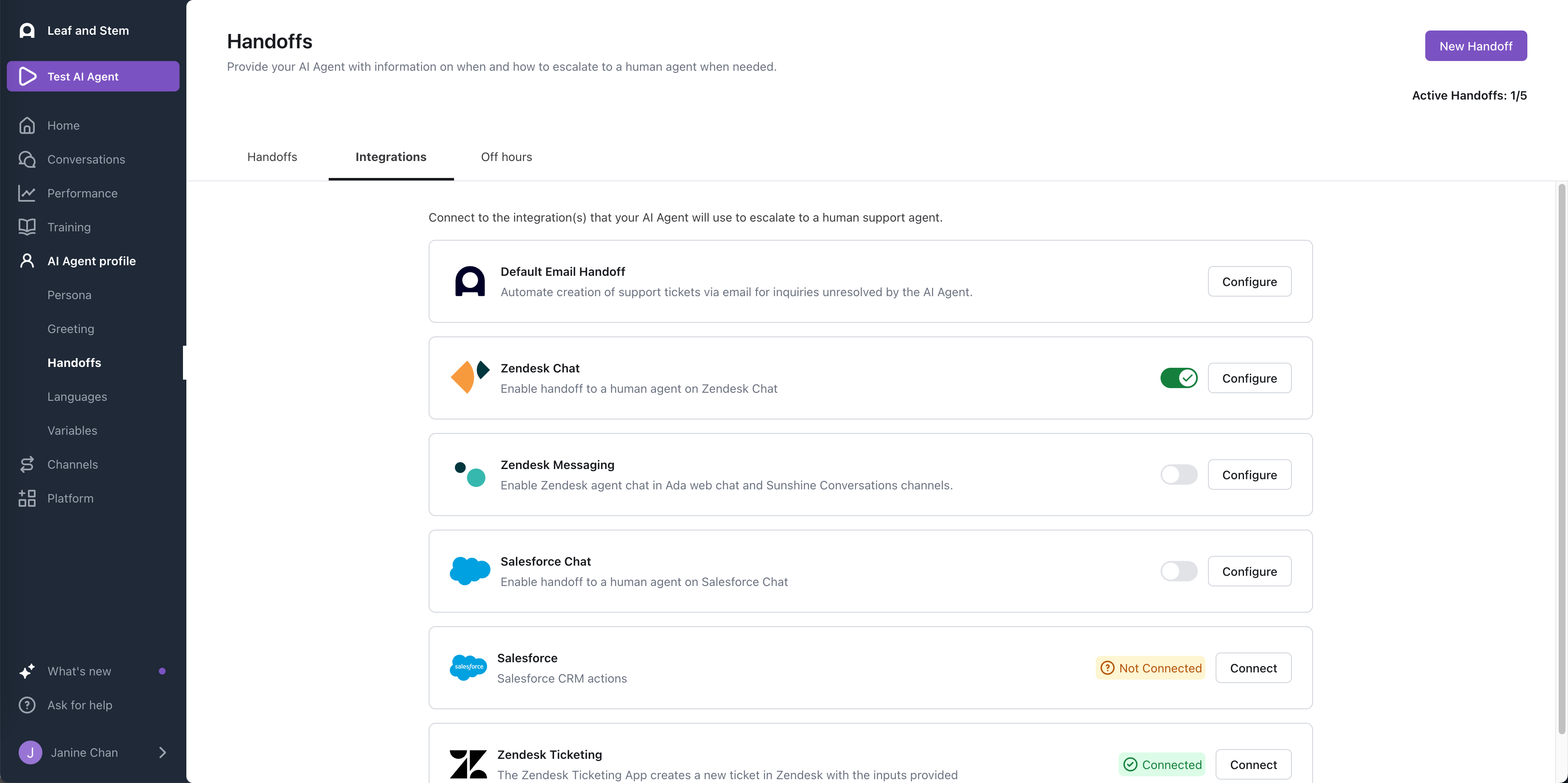
Ada makes chatbot creation and management easy for enterprises without technical know-how by providing a no-code solution. This AI chat program is renowned for being straightforward to use, with a multilingual UI and compatibility for several languages.
Ada allows businesses to deploy chatbots quickly and efficiently, automating customer interactions with minimal technical involvement.
Key Features
- No-code automation
- AI-powered automation
- Multichannel support
- Customizable AI agents
- Integration capabilities
Pros
- The tool offers a no-code solution, allowing businesses to create and manage chatbots without any technical expertise.
- The platform enables businesses to deploy chatbots rapidly.
- It is designed specifically for customer support.
Cons
- Ada's customization options are more limited compared to more advanced platforms.
- Its simplicity might not meet the demands of businesses requiring more complex or sophisticated chatbot functions.
Pricing
Users can get pricing details on request.
*Pricing as of 07-11-2024*
How to Select a Conversational AI Platform?
Choosing the right conversational AI platform depends on several factors. Here’s what you need to consider:
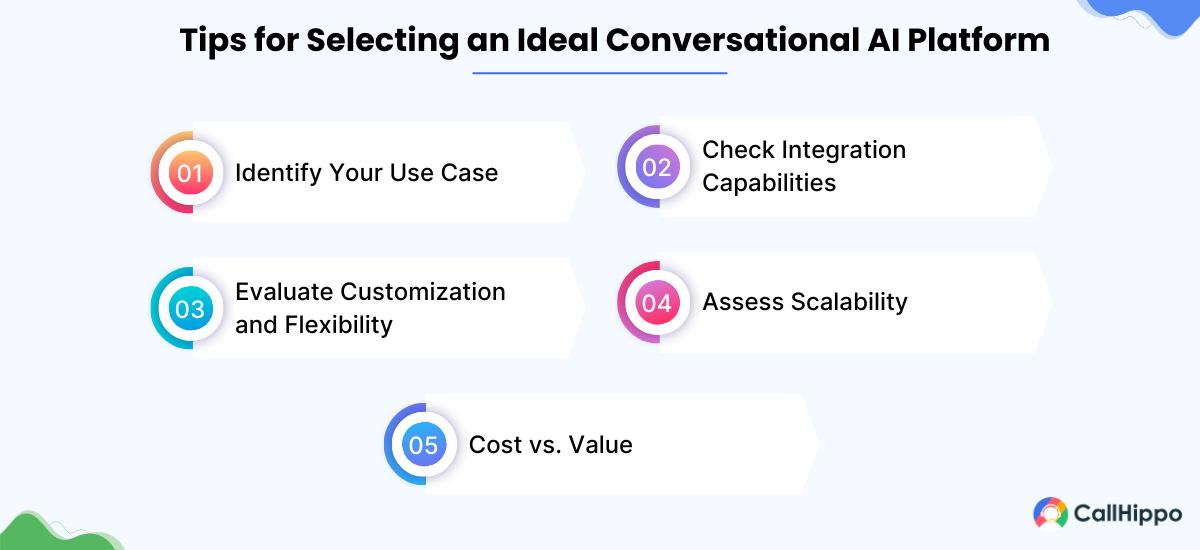
1. Identify Your Use Case
The first step is understanding what you need the platform for. Do you want to improve customer service, automate lead generation, or enhance your internal support system? Different platforms cater to various needs, so identifying your use case will help narrow your choices.
Ada and LivePerson are recommended for their user-friendly interfaces and specialized features that streamline customer service interactions, making it easy to resolve queries efficiently. Conversely, Rasa is ideal for businesses needing advanced customization and flexibility in complex automation scenarios, allowing for tailored solutions that fit unique operational requirements.
2. Check Integration Capabilities
A conversational AI platform should integrate seamlessly with your existing tools like CRM, ERP, or marketing software. Without proper integration, you could face operational inefficiencies and data silos.
(CallHippo, for instance, integrates easily with other platforms, ensuring a smoother workflow and unified data access across departments).
If your conversational AI platform doesn’t sync with your current setup, it may require additional custom development, leading to higher costs and extended timelines.
3. Evaluate Customization and Flexibility
No two businesses are the same, and neither should their conversational AI platform be.
Customization is key when choosing the right platform. Some businesses require fully customized AI models (like Rasa), while others need a more plug-and-play solution (like Google Dialogflow).
If your business requires handling complex queries or specific workflows, look for a platform with customizable AI models. If you’re looking for fast implementation and simplicity, a solution with predefined workflows might be better suited.
4. Assess Scalability
Scalability is often overlooked when choosing an AI platform, but it’s critical for future growth. You need a solution that can handle increased traffic, multilingual conversations, and diverse customer needs as your business expands.
Platforms like Microsoft Azure Bot Service and Amazon Lex are built to support enterprise-level scaling. If your business expects to expand rapidly, ensure that your conversational AI solution can scale without the need for major overhauls.
5. Cost vs. Value
When evaluating a conversational AI platform, cost is undeniably a significant factor, but the value you derive from it should be the true measure of success. You should clearly understand what you are going to invest for and what the return will be.
Questions to Ask Yourself:
- What is the total cost of ownership (TCO)?
- How does the platform’s pricing model fit my business?
- Does the platform charge per interaction, subscription, or based on users?
- Am I getting the features I need for the price?
- What’s the expected ROI?
Balancing cost and value means ensuring you’re investing in a platform that will provide a solid return in terms of efficiency, customer satisfaction, and future growth.
- In the early 2010s, the fight for leadership was head-to-head among the top companies like Google and Microsoft. Today, Apple is the leading company in AI acquisition.
Top 5 Conversational AI Use Cases
You can use conversational artificial intelligence to automate customer support, generate leads, assist employees, and personalize product recommendations. Let’s understand in detail.
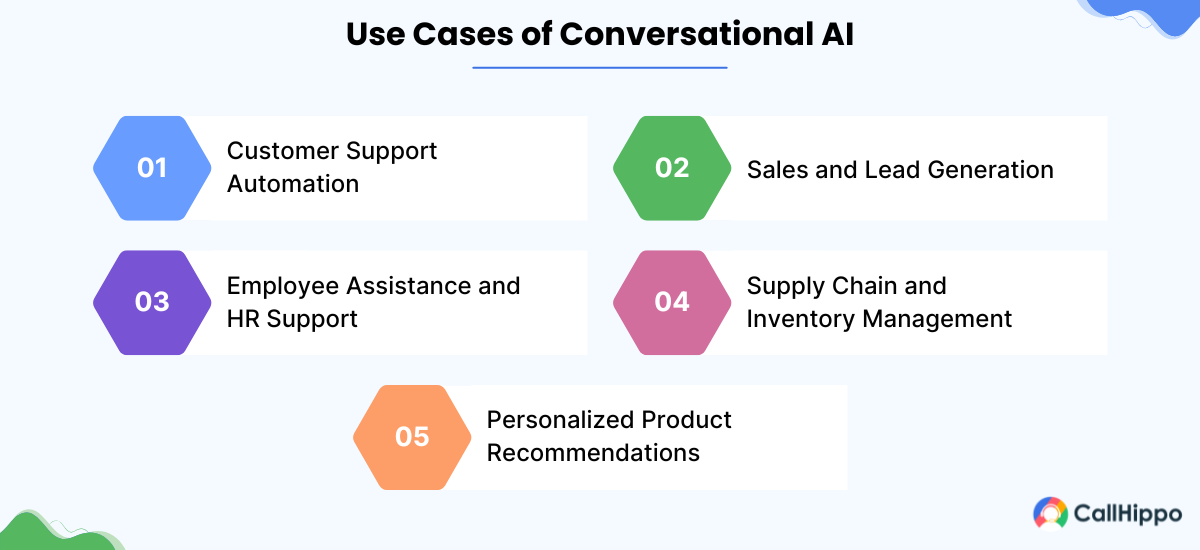
1. Customer Support Automation
Conversational AI in B2B customer support allows companies to provide immediate assistance to clients, handle multiple inquiries simultaneously, and offer support outside of regular business hours.
Here’s how B2B companies can use it.
- Deploy AI chatbots to handle common queries instantly and accurately.
- Analyze customer interactions to route tickets to the most suitable department or specialist.
- Analyze patterns in customer behavior to predict and address potential problems to reduce churn.
2. Sales and Lead Generation
A good conversational AI solution can engage prospects more effectively and simplify their sales process.
It can handle initial customer interactions, qualify leads, and provide instant information, allowing sales teams to focus on building relationships.
Here are some ways to leverage this conversational AI technology for sales and lead generation.
- Use AI-powered chatbots to qualify leads through preliminary conversations.
- Provide instant, accurate information about products or pricing when potential clients have questions.
- Automatically schedule product demos or follow-up calls to streamline the sales pipeline.
3. Employee Assistance and HR Support
Conversational AI can streamline internal operations, particularly in human resources and employee support.
It provides quick, accurate responses to common queries, automates routine tasks, and ensures consistent information dissemination across the organization.
Here’s how B2B companies can implement it.
- Create an AI-powered helpdesk to answer routine HR queries about policies, benefits, and procedures.
- Automate some aspects of the onboarding process for new employees and provide instant access to necessary information.
- Assist with leave applications and expense report submissions, reducing administrative workload.
4. Supply Chain and Inventory Management
Conversational AI technology can enhance supply chain efficiency and inventory control. It provides real-time insights, automates routine tasks, and facilitates better communication between different parts of the supply chain.
This can lead to reduced costs, improved accuracy, and better decision-making. In fact, 44% of business leaders say AI helps improve productivity, while 41% say it improves decision-making.
Here are some practical applications of conversational AI services in supply chain management.
- Introduce real-time inventory tracking systems and automate the reordering process.
- Use AI for supplier communication and order status updates.
- Apply predictive analytics for demand forecasting and stock optimization.
5. Personalized Product Recommendations
Conversational AI enables B2B companies to provide tailored product suggestions based on client needs and behavior. Since it continuously learns from customer behavior, it can hyper-personalize in real time to boost customer satisfaction and increase sales.
Here’s how to use this conversational AI technology.
- Analyze purchase history to recommend products or services.
- Suggest upgrades or new solutions based on the client’s needs.
- Provide real-time customization options for complex products or services.
Top 5 Benefits of Conversational AI
Conversational AI improves customer experience, reduces costs, increases customer and employee engagement, and provides multi-lingual support. Let’s understand these key benefits of conversational artificial intelligence.
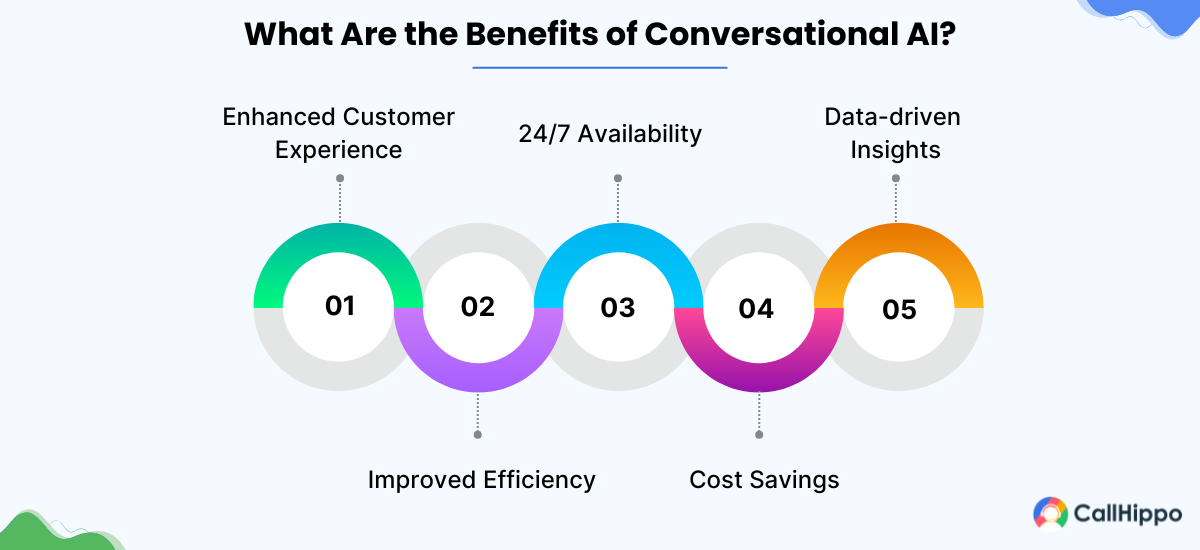
1. Better Customer Experience
Conversational AI transforms customer interactions by delivering instant, personalized responses 24/7. It can handle multiple queries simultaneously, eliminating wait times that often frustrate customers.
Besides, with access to vast information databases, AI systems provide accurate and consistent answers. Since conversational AI technology learns from every interaction, they become better at understanding context and nuance, leading to increasingly natural conversations and improving customer experience.
2. Cost Efficiency
Conversational AI automates routine inquiries and tasks and allows businesses to mitigate operational costs. Companies can manage a large volume of basic customer interactions without constant human intervention.
This automation enables organizations to strategically allocate their human resources to complex issues that require empathy, creativity, or critical thinking. This leads to substantial savings in staffing and training costs while maintaining high-quality service for nuanced customer needs.
3. Data-Driven Insights
Every interaction with a conversational AI system generates valuable data about customer preferences, common issues, and behavior patterns.
This wealth of information allows businesses to identify trends, anticipate needs, and make better decisions about product development or service improvements. Advanced analytics can uncover hidden patterns in customer behavior, helping companies predict market shifts or emerging customer needs.
4. Multilingual Support
Multilingual support is a key advantage of conversational AI, enabling businesses to engage with a diverse global audience. These platforms can understand and respond in multiple languages, breaking down language barriers that often hinder effective communication.
Businesses can encourage integration and improve accessibility by offering services in the languages that customers want. Besides increasing customer satisfaction, this feature broadens market reach.
5. Proactive Engagement
Conversational AI initiates interactions based on user behavior or predefined triggers. This helps prevent issues before they escalate and enhances the user experience.
For instance, an AI system might notice a customer repeatedly visiting a specific product category and offer tailored suggestions or answer potential questions. In technical support scenarios, it could detect unusual usage patterns and reach out with preventative advice, reducing the likelihood of service disruptions.
- Conversational AI is not just a chatbot; it should align with your business goals and adapt over time to changing customer needs. Proper training and continuous updates are essential for long-term success.
Conclusion
Understanding how conversational AI works and choosing among the top conversational AI platforms can transform how your business interacts with customers and manages internal operations. With the top 10 platforms listed here, you have a range of options to suit different needs and budgets.
Invest in the best conversational AI platform that aligns with your goals, and watch as it revolutionizes your business operations and customer interactions.
As AI technology continues to evolve, the future of conversational AI holds immense potential for creating seamless, human-like interactions.
FAQs
1. What is an example of a conversational AI?
An example is IBM Watson Assistant, which enables businesses to provide automated support through chatbots or voice assistants.
2. What are the 4 types of AI with examples?
The four types of AI are Reactive Machines (Deep Blue), Limited Memory (self-driving cars), Theory of Mind (robots with social understanding), and Self-Awareness (hypothetical future AI).
3. What is the difference between AI and conversational AI?
AI refers to any machine or software mimicking human intelligence, while conversational AI focuses specifically on dialogue-based interactions through text or speech.
4. What is the future of conversational AI?
The future of conversational AI involves more sophisticated interactions, improved NLP, and greater automation across industries like healthcare, banking, and retail.

Subscribe to our newsletter & never miss our latest news and promotions.









